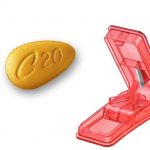Does Cialis Make You Last Longer?

What is erectile dysfunction (ED)?
An erectile dysfunction (ED) is the inability to get or keep an erection firm enough to have sexual intercourse. It’s sometimes referred to as impotence, although this term is now used less often.
Occasional ED isn’t uncommon. Many people experience it during times of stress. Frequent ED, however, can be a sign of health problems that need treatment. It can also be a sign of emotional or relationship difficulties that you may want to address with a professional.
What causes an erection?
ED can occur because of problems at any stage of the erection process. An erection is the result of increased blood flow into your penis. Blood flow is usually stimulated by either sexual thoughts or direct contact with your penis.
When a man is sexually excited, a muscle within the blood vessels in the penis relaxes. This allows for increased blood flow through the penile arteries, filling two chambers inside the penis. As the chambers fill with blood, the penis grows rigid. An erection ends when the muscles in the blood vessels contract and the accumulated blood can flow out through the penile veins.
How can a man last longer during intimacy?
If there’s a one-bedroom topic that concerns men as much as size, it’s stamina. The Internet is filled with solutions for those who feel like they don’t have enough lasting power. But only some of them are worthwhile. How can you tell which are worth your interest and money?
According to one study that measured the performances of 1,587 men, the average time a man can maintain last is seven minutes. Men who suffer from erectile dysfunction, a diagnosable condition average two minutes. Though not all men who want increased stamina would be diagnosed with ED, the treatment options are mostly the same.
What is Cialis?
Cialis is a brand of tadalafil, one of the most popular medications to treat erectile dysfunction (ED). It was first approved in 2003. Cialis is popular because it offers dosing flexibility, works well, and is convenient to take. Cialis is used to treat erectile dysfunction (impotence) and symptoms of benign prostatic hypertrophy (enlarged prostate).
Another brand of tadalafil is Adcirca, which is used to treat pulmonary arterial hypertension and improve exercise capacity in men and women. Do not take Cialis while also taking Adcirca, unless your doctor tells you to.
How does Cialis work?
Cialis is a phosphodiesterase type 5 (PDE5) inhibitor. It works for ED by relaxing the smooth muscle in the blood vessels of the penis, therefore increasing blood flow. PDE5 inhibitors only work in the presence of nitric oxide, which is naturally released during sexual arousal. PDE5 inhibitor medications work in 60 to 70 percent of people with ED.
Tadalafil is available in several doses in tablet form: 2.5 milligrams (mg), 5 mg, 10 mg, and 20 mg. Depending on the dose for ED, you can use it as needed before sexual activity, or take it once a day.
How long does Cialis last?
Generally, Cialis can work for up to 36 hours in your body. To treat erectile dysfunction (ED), your doctor may have you take Cialis only as needed before sexual activity. In this case, Cialis may keep working for up to 36 hours in helping you have and maintain erections during that time.
However, if you take Cialis each day for either benign prostatic hyperplasia (BPH) or ED, you’ll always have medication in your system. Therefore, it will continue to work throughout the day.
How should I take Cialis?
Cialis is usually taken only once per day. Follow all directions on your prescription label. Do not take this medicine in larger or smaller amounts or for longer than recommended.
Cialis can be taken with or without food.
Do not break or split a tablet. Swallow it whole.
For erectile dysfunction, take Cialis just before sexual activity but not more than once per day.
Cialis can help achieve an erection when sexual stimulation occurs. An erection will not occur just by taking a pill. Follow your doctor’s instructions.
Do not take Cialis for erectile dysfunction if you are taking Adcirca for pulmonary arterial hypertension.
Does Cialis make you last longer?
Yes, Cialis make you last longer in bed because it is a longer-lasting erectile dysfunction medication with effects that are noticeably longer (up to 36 hours) when compared to the effects of Viagra which typically last for between 4 to 6 hours.
Another advantage of Cialis over Viagra is that it’s always in effect so you can always be ready for sex if you need to, but that does not mean you’ll have an erection for 36 hours or 1.5 days straight.
However, it is important to note that while erectile dysfunction can be cured, it depends on the cause. Some causes of ED are easier to “cure” than others. But, with the right diagnosis, support, and treatment, it’s possible for ED to go away without the need for ED medications like Cialis (Tadalafil) OR Viagra (sildenafil).
What are the side effects of Cialis?
Along with its needed effects of making you last longer, Cialis may cause some unwanted effects. Although not all of these side effects may occur, if they do occur they may need medical attention.
Check with your doctor immediately if any of the following Cialis side effects occur:
Less common
• Arm, back, or jaw pain
• blurred vision
• chest pain, discomfort, tightness, or heaviness
• chills
• cold sweats
• confusion
• dizziness
• fainting
• faintness or lightheadedness when getting up suddenly from a lying or sitting position
• fast or irregular heartbeat
• headache
• hearing loss
• increased erection
• nausea
• nervousness
• pain or discomfort in the arms, jaw, back, or neck
• pounding in the ears
• slow or fast heartbeat
• spontaneous penile erection
• sweating
• unusual tiredness or weakness
• vomiting
Rare
• Painful or prolonged erection of the penis
Incidence not known
• Blindness
• blistering, peeling, or loosening of the skin
• cough
• cracks in the skin
• decrease or change in vision
• diarrhea
• difficulty with speaking
• double vision
• fast, irregular, pounding, or racing heartbeat or pulse
• headache, severe and throbbing
• hives or welts, itching, skin rash
• inability to move the arms, legs, or facial muscles
• inability to speak
• joint or muscle pain
• loss of heat from the body
• numbness or tingling of the face, hands, or feet
• red skin lesions, often with a purple center
• red, irritated eyes
• red, swollen skin
• redness of the skin
• redness or soreness of the eyes
• scaly skin
• slow speech
• sores, ulcers, or white spots in the mouth or on the lips
• stomach pain
• sudden cardiac death
• swelling of the feet or lower legs
Some Cialis side effects may occur that usually do not need medical attention. These side effects may go away during treatment as your body adjusts to the medicine. Also, your health care professional may be able to tell you about ways to prevent or reduce some of these Cialis side effects. Check with your health care professional if any of the following side effects continue or are bothersome or if you have any questions about them:
More common
• Belching
• heartburn
• indigestion
• stomach discomfort, upset, or pain
Less common
• Bloody nose
• body aches or pain
• burning, crawling, itching, numbness, prickling, “pins and needles”, or tingling feelings
• burning, dry, or itching eyes
• burning feeling in the chest or stomach
• congestion
• difficulty with moving
• difficulty with swallowing
• dry mouth
• dryness or soreness of the throat
• excessive eye discharge
• eye pain
• feeling of constant movement of self or surroundings
• feeling of warmth, redness of the face, neck, arms, and occasionally, upper chest
• fever
• hoarseness
• lack or loss of strength
• loose stools
• muscle aching, cramping, or stiffness
• neck pain
• pain in the arms or legs
• pain or burning in the throat
• redness, pain, swelling of the eye, eyelid, or inner lining of the eyelid
• reduced sensitivity to touch
• runny or stuffy nose
• sensation of spinning
• sleepiness or unusual drowsiness
• stomach upset
• swelling of the eyelids
• swelling or puffiness of the eyes or face
• swollen joints
• tearing
• tender, swollen glands in the neck
• tenderness in the stomach area
• trouble with sleeping
• upper stomach pain
• voice changes
• watering of the eyes
Rare
• Changes in color vision
Other Cialis side effects not listed may also occur in some patients. If you notice any other effects, check with your healthcare professional.
Call your doctor for medical advice about side effects. You may report side effects to the FDA at 1-800-FDA-1088.
Important warnings
• Heart disease warning. You shouldn’t use tadalafil if you have a heart condition and your doctor has advised against sexual activity. Call your doctor right away if you have symptoms during sex such as chest pain, dizziness, or nausea. Sexual activity can put an extra strain on your heart. This is especially true if your heart is already weak from a heart attack or heart disease.
• Priapism warning. Priapism is an erection that won’t go away. Without treatment, this condition could cause permanent damage to your penis. This damage includes impotence (not being able to have an erection). If you get an erection that lasts more than 4 hours, call your doctor right away.





